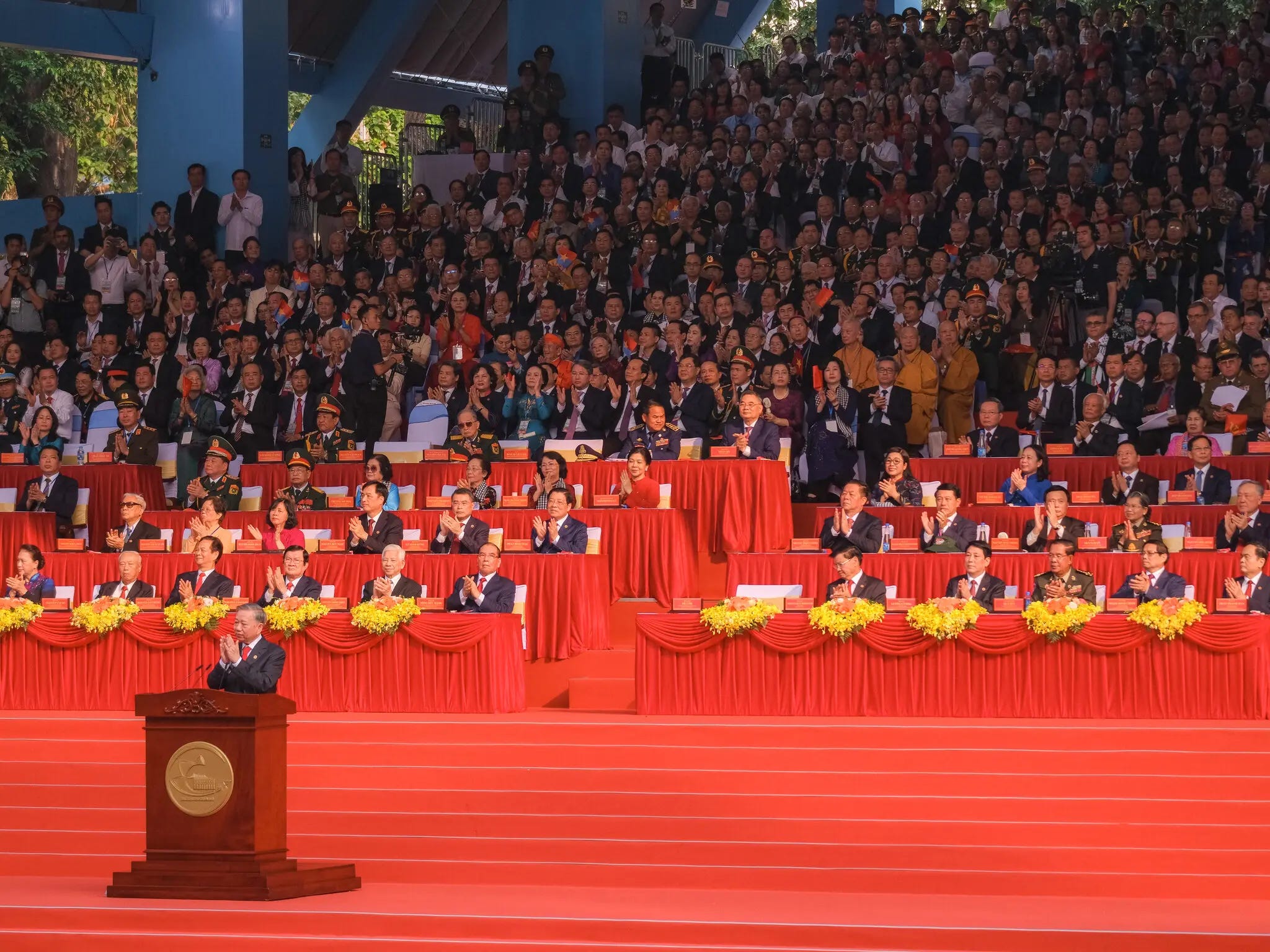Good Thursday morning, friends!
We are almost at the weekend, which makes me so happy. We’re having friends over for dinner tomorrow evening, hanging out on Saturday (and I hear it will be raining, which is my absolute favorite thing) and then Sunday is church, brunch at a delicious restaurant, and a movie in the evening. I think we might give the new Padington movie a try, hoping it won’t be a total flop (have you seen it?!)
Enough about me, let’s jump into the Dawn Dispatch…

Vietnam Marks 50th Anniversary of Saigon’s Fall with Chinese Military Parade
Details: Ho Chi Minh City hosted a parade yesterday, celebrating the 50th anniversary of Saigon’s fall and the Vietnam War’s end, with Chinese soldiers marching alongside Vietnamese troops. The event, attended by global dignitaries, highlighted Vietnam’s growing ties with China, a former foe, amid U.S. trade tensions. Vietnam’s economy, boosted by tech and manufacturing, is pivoting toward Beijing. The parade comes as Trump’s tariffs hit Asian supply chains, pushing Vietnam to deepen China ties for economic stability.
Why It Matters:
Chinese troops marching in Vietnam is a big deal—it’s a strong signal to the U.S. which fought a brutal war 50 years ago.
Vietnam’s economy, a $430B powerhouse, is a key player in tech (think Apple suppliers). If it leans harder into China’s orbit, the U.S. could lose leverage in Asia, especially with tensions over Taiwan and the South China Sea.
Some say that it’s a wake-up call: Dems say that Trump’s “America First” is alienating partners, and China’s filling the void, reshaping global power dynamics.
Political Implications:
The China-Vietnam flex weakens Trump’s Asia strategy, giving Dems a chance to slam his foreign policy as shortsighted. Swing voters might notice.
Dems could push for renewed Asia engagement, citing Biden-era alliances, but risk looking soft on China. It’s a balancing act before midterms.
China’s parade cameo boosts its regional swagger, challenging U.S. influence. It’s almost like a taunt.
Ukraine and U.S. Seal Historic Minerals Deal, Tying Reconstruction to Rare Earths
Details: Yesterday, the U.S. and Ukraine signed a long-awaited minerals deal, establishing what they are calling the, “U.S.-Ukraine Reconstruction Investment Fund” to jointly develop Ukraine’s vast mineral resources, including lithium, graphite, and titanium, critical for the tech and defense industries. The agreement was announced by Treasury Secretary Scott Bessent and Ukrainian Economy Minister Yulia Svyrydenko after months of tense negotiations. The deal, a 50-50 partnership, sees Ukraine contribute 50% of future revenues from state-owned mineral, oil, and gas assets to the fund, which will finance reconstruction projects. It excludes existing revenue sources like Naftogaz, focusing on new investments. No U.S. security guarantees were included, a sticking point for Ukraine. President Trump hailed it as a win, saying it secures U.S. access to Ukraine’s rare earths while giving Kyiv an “American presence” for stability. Ukrainian PM Denys Shmyhal called it a “huge benefit,” potentially unlocking military aid. The deal followed a February 2025 Oval Office clash between Trump and President Volodymyr Zelenskyy, where an earlier $500B demand was dropped.
Why It Matters:
Ukraine has 5% of the world’s critical minerals, including 20% of global graphite reserves, and this deal gives the U.S. a shot at breaking China’s 75% stranglehold on rare earths. With China banning exports to the U.S. in December 2024, this is a big move for tech supply chains—think batteries, jets, and tanks. For Ukraine, it’s a lifeline for rebuilding a war-torn economy, but the lack of security guarantees stings—Zelenskyy’s been begging for NATO or U.S. protection against Russia. The deal ties Kyiv’s future to American cash, not just goodwill, which could keep the lights on, but risks dependency. This matters because it’s Trump’s “transactional diplomacy” in action—America gets minerals, Ukraine gets funds, but the war’s still raging, and Russia’s not sweating. It’s a high-stakes bet that could reshape global resource wars or leave Ukraine shortchanged.
Political Implications:
Trump’s has said that this is a needed payback for $183B in U.S. aid without giving up security promises. His base loves the deal (40% approve, per Reuters.)
Some are saying that Zelenskyy is under fire at home—Ukrainian MPs demand transparency, feeling sidelined. Rejecting earlier $500B drafts saved face, but no security guarantees could weaken his grip, especially with Russia’s ceasefire talk looming.
Globally: China’s watching, and a U.S. mineral grab could spark retaliatory export bans, spiking tech costs. Allies like Canada, fresh off Mark Carney’s win, might back Ukraine’s sovereignty.
U.S. Economy Contracts in Q1 2025, GDP Drops 0.3%
Details: The BEA’s advance estimate shows real GDP decreased at an annual rate of 0.3% in Q1 2025 (January–March), a sharp reversal from Q4 2024’s 2.4% growth. This is the first contraction since 2022, per Reuters. The Federal Reserve Bank of Atlanta’s GDPNow had forecast a steeper -2.7%, so it’s not as bad as feared, but still a bit of a gut punch.
Key drivers: A surge in imports (up 7.2%, subtracting from GDP) as businesses stockpiled goods to dodge Trump’s 10% global tariffs and 25% on some countries, plus a drop in government spending. Consumer spending (up 0.7%) and investment softened the blow, but not enough. Personal income rose $116.8B (0.5% monthly rate) in March, with disposable personal income up $102B (0.5%). Personal consumption expenditures (PCE) jumped $134.5B (0.7%), reflecting panic-buying of cars and durable goods before tariff hikes, per BEA. Core PCE inflation (the Fed’s favorite gauge) hit 2.6% annually, up from 2.5% in February, signaling sticky prices. The trade deficit narrowed to $122.7B in February from $130.7B, as exports rose and imports dipped slightly, but March’s import flood widened it again. Consumer confidence seems to be declining, with the University of Michigan’s index at its second-lowest since 1952, expecting 6.7% inflation ahead.
Why It Matters:
A 0.3% GDP drop is a warning light, some say—with Trump’s tariffs possibly limiting growth, with imports (think Chinese electronics, Mexican auto parts) flooding in before costs spike. This isn’t just numbers; it’s higher prices at Walmart and layoffs at factories (20,000 at UPS alone). The economy’s 70% consumer-driven, and that PCE surge is fear, not faith—folks are buying now to avoid tomorrow’s pain.
Sticky 2.6% core PCE inflation means the Fed’s not cutting rates soon, squeezing borrowers with 5%+ mortgage rates. The trade deficit’s yo-yo shows Trump’s “America First” isn’t closing gaps—it’s chaos, with companies like Samsung slashing forecasts due to tariff uncertainty.
This matters because a shrinking economy with rising prices is a voter’s nightmare. Trump’s betting on tariffs to bring jobs, but if the Dow’s 6.8% slide and 80,000 Michigan jobless claims are any hint, he could be playing with fire. People feel this at the pump, the grocery store, and the unemployment line. Still, many in middle America and with small businesses that are being impacted by the tariffs are saying that it’s worth a little pinch for long term results.
Biden Judge Slaps Border Patrol with Warrant Rule, Demands Deportation Reports in California
Details: On Tuesday, U.S. District Judge Jennifer L. Thurston, a Biden appointee, issued a preliminary injunction barring Border Patrol agents in California’s Eastern District (Bakersfield to Oregon border) from arresting suspected undocumented immigrants without a warrant or probable cause. The ruling also bans stops without reasonable suspicion and “voluntary departures” (quick deportations) unless individuals are informed of their rights and consent. Agents must submit reports every 60 days detailing all detentions and warrantless arrests, including reasons, until the lawsuit is resolved.
The order stems from a January 2025 “Operation Return to Sender” raid in Kern County, where 78 people, mostly farmworkers and day laborers, were detained. The ACLU, suing on behalf of United Farm Workers, alleged agents targeted “brown-skinned” residents without cause, slashing tires, yanking people from trucks, and coercing signatures to waive immigration hearings. A U.S. citizen was among those nabbed. Thurston’s 88-page ruling called it a “pattern and practice” of violating Fourth Amendment rights, rejecting Border Patrol’s claim that new training (270 of 900 El Centro agents retrained) makes the lawsuit moot. She snapped, “You just can’t walk up to people with brown skin and say, ‘Give me your papers.’”Border Patrol argued Thurston lacks jurisdiction, citing federal law limiting immigration appeals to final orders, and claimed the raid targeted one criminal but netted others (e.g., two child rapists, per agent posts). CalMatters found no prior criminal data for 77 of 78 detainees. CBP’s silent on compliance.
Why It Matters:
This ruling’s a gut shot to Trump’s mass deportation push—39,000 to Mexico, hundreds to Guantanamo—which is his 100-day calling card - it’s what his voters want (including myself.) Requiring warrants in California’s farm-heavy Eastern District slows ICE’s roll, protecting workers but infuriating border hawks who see it as open season for illegal crossings.
The 60-day reports put Border Patrol under a microscope, forcing transparency on raids that’ve sparked outrage (e.g., Avelo Airlines’ ICE flights). Thurston’s framing—calling out racial profiling—hits a nerve in a state where 60% of farmworkers are undocumented (per USDA). It’s a legal shield for communities, but many would say (myself included) it handcuffs law enforcement.
It’s a test of Trump’s power versus the judiciary. With 100+ lawsuits against his policies, this could inspire more blue-state judges to push back. It’s happening more and more.
Political Implications:
A large percentage of Trump’s base approve of his immigration stance (Reuters)—who see Thurston as a “Biden judge” sabotaging border security. Trump’s team might defy the order (like Scott Jennings suggested on CNN), escalating his war on courts, but that risks alienating moderates (47% disapprove, NPR).
Dems, especially in California, can rally Latinos and progressives, framing Thurston’s ruling as a stand against Trump’s “racist raids.” Senator Alex Padilla’s already pushing sanctuary policies, but overplaying it could backfire in swing districts where 55% want stricter borders (Gallup 2024). Republicans, for their part, back Trump’s ICE surge. If raids stall, GOP faces heat from both farmers and hardliners.
Supreme Court Leans Positive Toward Nation’s First Taxpayer-Funded Religious Charter School
Details: Yesterday, the U.S. Supreme Court heard arguments over St. Isidore of Seville Catholic Virtual School, an Oklahoma proposal to create the first publicly funded religious charter school, backed by the Catholic Archdiocese. Conservative justices, led by Brett Kavanaugh and Samuel Alito, signaled support, arguing that excluding religious schools from charter programs is “rank discrimination,” while Chief Justice John Roberts emerged as a potential swing vote; Justice Amy Coney Barrett recused herself, raising the risk of a 4-4 tie that would uphold Oklahoma’s ban.
Political Implications:
Dems, backed by ACLU and teachers’ unions, will slam this as a GOP attack on public education, rallying secular voters but struggling in red states where 70% support school choice (Gallup 2024).
Republicans, with allies like Gov. Kevin Stitt, gain traction in conservative states, but blue-state pushback could kill charter programs, hurting GOP’s school choice agenda.
School choice is a growing movement all around the country so I’m curious to see how this plays out!
A few more things….
The Florida legislature passed Senate Bill 56, banning the release of chemicals or devices into the atmosphere to alter weather or climate, with violators facing up to $200,000 in fines or five years in prison, awaiting Gov. Ron DeSantis’ approval. Aimed at stopping “chemtrails” and geoengineering like cloud seeding.
Isabelle St. Cyr, a 24-year-old from Monson, will be the first openly transgender “woman” to compete in the Miss Maine USA pageant on May 10–11, 2025, calling it a “blessing” to represent his community amid rule changes allowing trans women.
The United States Postal Service will be cutting 200,000 jobs as Amazon shipments lower, per CBS.
What’s going on in D.C. today?
President Donald Trump will participate in a National Day of Prayer event in the Rose Garden at 11:00 a.m.
That’s the Dawn Dispatch for May 1st, 2025 - I’ll see you back here, bright and early, tomorrow morning!















Share this post